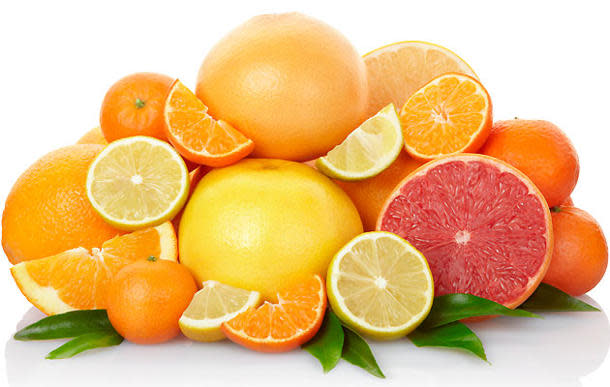 Shine On
Shine OnCitrus fruits help prevent strokes

That daily glass of orange juice isn't just keeping scurvy (or the flu) at bay; a new study has found that citrus fruits may be helping to reduce our stroke risk, too.
Published in the appropriately titled journal Stroke: Journal of the American Heart Association, the study claims that the flavonoids in oranges and grapefruits — called flavanones — protect brain cells, strengthen and tone blood vessels, and have anti-inflammatory properties, whereas the intake of other non-citrus flavonoids did not.
The study looked at 14 years of data from a health study that involved 69,622 healthy women who, every four years, reported on their food intake.
The findings, summed up in The Globe and Mail: "Women who consumed the most flavanones were 19 per cent less likely to suffer a blood-clot related stroke compared to their peers whose diet contained the least."
It should be noted that flavonone intake did not affect hemorrhagic strokes, which are caused by bleeding in the brain.
"Our study supports the conclusion that flavanones are associated with a modest reduction in stroke risk," says researcher Kathryn M. Rexrode, MD, MPH.
Rexrode adds that more research needs to be done, and that we shouldn't be running out to buy flavanone supplements just yet. But an orange with lunch certainly wouldn't hurt.
[See also: New uses for lemons]
"This is very provocative research which suggests that including citrus fruits in your diet could lower stroke risk," she says.
The woman who consumed the most flavanones reported at least 63 milligrams of flavanones a day, the equivalent of one cup of orange juice and one pink grapefruit.
We already know that citrus is a bit of a superfood — it keeps us slim, healthy, and young-looking — but now it might save our lives too.
Keep your citrus intake waistline-friendly by eating the fruit whole, rather than consuming sugar-packed juices:
"Given the higher flavanone content of citrus fruits and the sugar content of commercial fruit juices, public health recommendations should focus on increasing citrus fruit intake," the researchers recommend.
Here are a few ways to add citrus into your diet.
Note: Grapefruit can be a problem if you're taking certain medications, so before you jump into a daily citrus routine, check with your pharmacist that there won't be a problem with drug absorption.
The study does have its critics. It's hard to measure diet-related cause-and-effect like this, which leaves ABC News' health and medical editor Dr. Richard Besser claiming that the findings "go beyond the data."
The healthier women in the study consumed other flavanoids and smoked less, exercised more, and ate a better diet than the women found at greater stroke risk in the study. Healthy lifestyle might be a far more significant factor. And the vitamin C and potassium in citrus fruits might be equally as valuable.
Do you eat citrus on a daily basis?
To find out which foods are powerfoods for your brain, watch the video below.
More from Shine on Yahoo! Canada
The salad green you should be eating more of
Fruits to keep out of the fridge
Why you should be drinking beet juice

